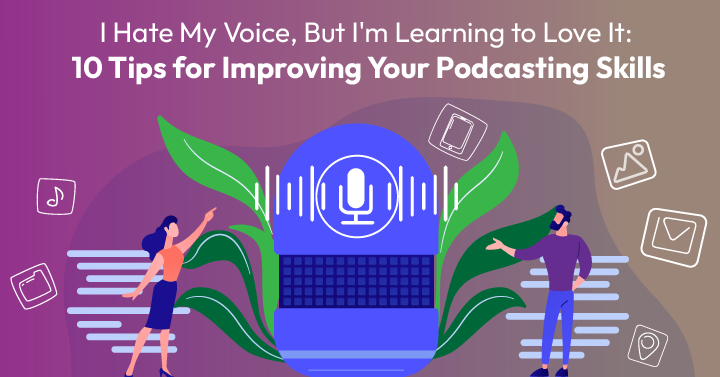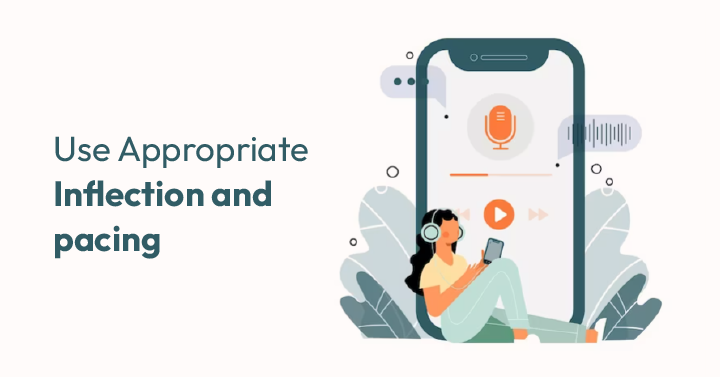
- Why do people dislike the sound of their own voice?
- Tips on How to Stop Hating Your Voice
- Listen to good podcasters and emulate their speaking style
- Boost your confidence
- Determine the tone and style of your podcast
- Write concise and clear sentences in your scripts
- Practice good posture and breathing exercises
- Use appropriate inflection and pacing
- Vary your tone and pitch to keep the listener engaged
- Do vocal warm-ups regularly to prepare your voice
- Be patient and persistent with your practice
- Record and listen to your voice for self-improvement
- FAQs
One of the most common refrains you hear from people just starting out on a new podcast project is: “I hate my voice when I talk.” It’s hardly surprising. Many people have never listened to a recording of themselves before and are surprised (perhaps even horrified) by how they sound. Before you decide to give up speaking and take up sign language, however, bear in mind that podcasting, like most creative pursuits, involves a small element of natural talent and a whole lot more learned skill.
Even the best podcasters started out sounding a little awkward and bumbling. It takes time and practice to get into a nice, smooth speaking rhythm. So, if you’re thinking, ‘I hate my voice, can I change it?’, the answer is a resounding ‘Yes,’ as we’ll discuss in this article.
1. Why do people dislike the sound of their own voice?

1.1 External sounds
Most people think their voice sounds deeper than it actually does. That’s because when they hear their voice inside their own head, the sound is traveling through bone and tissue, which enhances lower-frequency vibrations. When you process external noise, such as listening to a podcast recording, the sound is transmitted through air conduction, which results in a higher pitch.
1.2 Speaking too quickly
There are several reasons why you might be speaking too quickly, including because your thoughts are racing or because you’re feeling nervous. These are both natural impulses, as is feeling frustrated that your voice isn’t as well-paced as seasoned podcasters.
1.3 Low self-esteem
People who struggle with confidence can often communicate this unintentionally through their speech delivery. It can manifest through a trembling tone or a breathiness that breaks up sentences. Evidence of anxiety can affect the listener’s experience, causing them to feel nervous in turn.
1.4 Mispronouncing words
Most people know that creating a compelling podcast involves having a tight script. What they might not realize is that reading aloud is actually quite challenging, with lots of scope for stumbling over words and garbling sentences. Bear in mind that what looks good on the written page might actually be overly laborious when spoken aloud.
1.5 Inefficient breathing techniques
As any professional voiceover artist will tell you, mastering the correct breathing techniques is incredibly important to creating smooth audio. Without practice, you may find yourself running out of breath mid-sentence or failing to speak with power and volume.
1.6 Skipping vocal warm-ups
Vocal warm-ups are as important for podcasters as they are for singers. Just like athletes, audio performers need to stretch beforehand, as failing to engage your vocal chords can leave you struggling for vocal flexibility.
1.7 Sounding overly rehearsed or robotic
On the other end of the scale from under-preparing, over-preparing can also lead to a dissatisfying recorded performance. You need to strike a balance between feeling confident you know your material and becoming so familiar with what you’re going to say that it comes off as rote, rather than conversational and spontaneous.
2. Tips on How to Stop Hating Your Voice

2.1 Listen to good podcasters and emulate their speaking style
If you want to move from ‘I hate my voice on recording’ to ‘I love my voice on recording,’ the first step is to listen to experienced podcasters. These folks have already perfected their speaking style and can serve as a good standard from which you can pick up a few techniques. That doesn’t mean you can’t put your own spin on your podcast delivery, but it doesn’t hurt to get a sense of how the pros do it.
Listening to good podcasters can also give you an idea of the kind of speed you should speak at. As a rough benchmark, most podcasters and radio hosts speak at a speed of about 150 to 160 words per minute.
2.2 Boost your confidence
This is probably the hardest tip to actually take action on. After all, there’s no sure-fire method to just magically become more confident.
Having said that, there are a few things you can do to create a sense of ease. Knowing you are well prepared, being in a comfortable environment and having plenty of practice can all help reduce stress and boost confidence.
2.3 Determine the tone and style of your podcast
There are lots of different types of podcasts, and the topic and content will to some extent help you determine the right form of delivery. For an educational podcast, for example, you want to sound authoritative and precise, while for discussion-based podcasts, you will probably want to have a more conversational, spontaneous tone.
Once you’ve settled on the style of your podcast, you then have a clearer idea of how to adapt your voice.
2.4 Write concise and clear sentences in your scripts
If you find yourself constantly stumbling over words, it might not be anything to do with your voice but everything to do with your script. As we have already noted above, mispronunciations can be a sign that your sentences are too complicated or overstuffed with verbiage.
It’s always worth reading aloud parts of your script as you’re working on it to see if there are any parts that stick in your throat. Sometimes, it can just be that you have trouble with a particular word or phrase, which might be worth rewriting to something that rolls off your tongue more fluently.
2.5 Practice good posture and breathing exercises
The most important thing to remember about posture is to have your mouth the right distance from the microphone. Usually, a gap of about 6 to 8 inches is a good starting point, but you should of course experiment with what sounds best for you, as factors like recording environment, the timbre of your voice and the mic quality will have an impact.
Whether you choose to sit or stand while recording is ultimately a personal decision, but bear in mind that standing allows you to open up your lungs and diaphragm for a more energetic sound.
Correct breathing is doubly important for podcasters, first because you don’t want to run out of air halfway through a sentence, and second, because you want to breathe in a way that doesn’t get captured on the recording. There are different techniques you can try to breathe deeply and silently so that you don’t have to spend ages editing out huffing and puffing later.
2.6 Use appropriate inflection and pacing

Inflection is the way you emphasize speech by making your voice go up or down in pitch. Different kinds of inflection can create different impressions on a listener. For instance, upward inflections usually indicate a question or surprise. While a lot of inflection is a natural, unconscious behavior, a good podcaster should be able to control the way they emphasize words to create a particular effect.
Inflection is often linked to pacing, as both are vocal aspects that we are generally unconscious of in our everyday speech but that can be controlled with practice. Again, increasing or decreasing pace can be used to influence the perception of what you’re saying, though overall you want to try and keep your voice fairly steady for ease of listening.
2.7 Vary your tone and pitch to keep the listener engaged
As humans, we tend to zone out if something remains too static. That’s why in podcasts to help you sleep, the speakers often employ a regular, droning tone with as little variation as possible. Obviously, most podcasters don’t want their audience to drift off while listening, which is why it’s important to vary your pitch.
There are classes you can take or even podcasts you can listen to to help you do this, but the easiest way to get started is simply to remember to put some emotion into what you’re saying. In trying to convey emotion, your tone and pitch will naturally modulate and become more engaging.
2.8 Do vocal warm-ups regularly to prepare your voice
Loosening up the vocal cords is essential if you want your voice to be nice and limber during your recording session. You can do this with a few pre-recording vocal warm-ups, such as the yawn-sigh, which reduces vocal tension.
It’s also useful to get your tongue working, so you have crisp enunciation on the podcast. Some people like to recite tongue twisters to get the organ working, while others employ a series of trills and rolls.
2.9 Be patient and persistent with your practice
Rome wasn’t built in a day and your voice won’t transform overnight. To fall back on a popular simile, your voice is like an instrument, and you only get better at an instrument through persistent practice.
It’s important not to get flustered if you don’t notice any improvement immediately. These things take time and patience to get right but trust us, you will steadily get better.
2.10 Record and listen to your voice for self-improvement
The most important thing you can do to stop hating your voice is to record and listen to yourself. Restrain the urge to just throw up your hands in exasperation when you don’t like the overall result. Instead, take a methodical, analytical approach and identify precisely what’s sounding bad to you. Is it the pitch? The breathing? The pace? All these things can be fixed once you know that there’s a problem.
The more time you spend recording and listening to yourself, the less time you’ll find yourself frustratedly yelling ‘I hate my voice.’
3. FAQs
- How do I get the best voice sound for my podcast?
Getting the best voice sound for your podcast is a combination of purchasing the right equipment and employing the right vocal techniques. With these two aspects sorted, you are in a good position to build a professional-sounding show.
- What can I do if I hate my voice?
The first thing to do is analyze precisely what you dislike about your voice. Once you know that, there are lots of different strategies to correct things like pacing, breathing and tone.
- How can I improve my voice modulation?
Practice, practice, practice. Unfortunately, there isn’t some magic potion you can take to immediately improve your voice modulation. Fortunately, it is something you can build upon over time by listening to recordings of yourself and tweaking your delivery.
- Can I alter my voice on a podcast?
Yes, you can alter your voice on a podcast. Aside from utilizing some of the techniques listed above, you can also edit the way you sound using a professional digital audio workstation. However, it’s important to remember that editing can only do so much and will add time to each podcast episode’s production.



